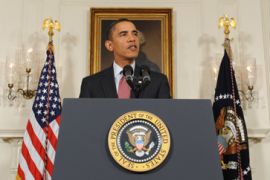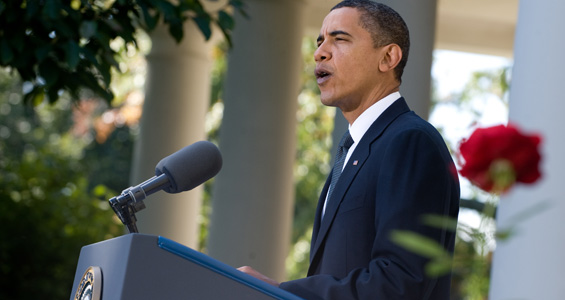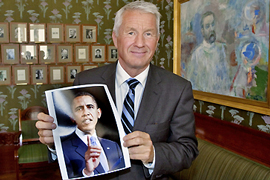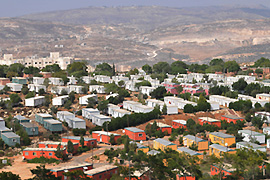Nobel committee bets ‘Obama can’
Washington must change if Obama is to succeed in global diplomacy, historian says.

 |
| The Nobel Peace Prize committee has awarded Barack Obama, the US president, a “means to give momentum” to changing US foreign policy, says LeVine [AFP] |
The idea of Barack Obama, the US president, winning the Nobel Peace Prize seems too far-fetched to believe.
An Egyptian colleague summed up the vehement objections voiced by many to the Nobel committee’s choice by pointing out that Obama’s Cairo speech, cited as one the justifications for his selection, has not been followed with substantial change in US policy.
What, she asked, has Obama done to make the world a more peaceful or just place?
With Israel and Iran each flouting US policy goals with equal impunity, it is hard to see the justification for rewarding the US president and architect of those policies, however laudable they may be.
‘Transformative figures’
| in depth | |||||||
|
Obama clearly understands this, which is why he admitted during his acceptance speech that he did not deserve to be considered a “transformative figure” of the kind which has been honoured by the committee in the past.
However, while other nominees might have risked or achieved more than the US president, the committee may perceive that the magnitude of the challenges he faces requires global acknowledgement and support.
“It is always a mix of idealism and realpolitik that can change the world,” Thorbjorn Jagland, the committee chairman and former Norwegian prime minister, explained.
Obama has clearly understood that by selecting him as the recipient this year, the committee has provided him with a “means to give momentum to a set of causes”.
Few would argue that the world needs to unite to face the challenges highlighted by the committee. The question is, under whose leadership and which vision?
Transcending Pax Americana
 |
| Thorbjoern Jagland says a mix of realism and realpolitik are need to solve global crises [AFP] |
Obama talks of re-engaging the world and utilising international institutions such as the UN. But he seems to be unable to transcend the long-standing view among US politicians that unity can only be achieved under a Pax Americana.
Obama remains as wedded as his predecessors to a belief in American exceptionalism (as Alexandre de Toqueville first described it) that gives the US the natural right and obligation to lead the world and, in his words, to reaffirm “American leadership on behalf of aspirations held by people in all nations”.
Engage, yes. Call on all nations to “take responsibility for the world we seek,” absolutely. But relinquish America’s self-appointed role as the light onto the nations, and the power and perks that go with it? Not very likely.
Indeed, as long as the US acts from the perspective of the world’s major imperial power, it will never be able to lead the way toward peace, even with Obama at the helm.
The entire edifice of US economic power and political and military might remains geared, as George Keenan first described it more than half a century ago, to ensuring that a country with roughly six per cent of the world’s population continues to control the majority of its wealth and resources.
This policy allows for dividing a huge share of the rest between its western allies and distributing enough scraps to Third World clients to perpetuate the system.
To achieve this goal, Keenan continued, “we have to dispense with all sentimentality and day-dreaming … concentrate everywhere on our immediate national objectives …[and] deal in straight power concepts. The less we are hampered by idealistic slogans, the better.”
Overwhelming challenges
 |
| Levine says Obama will be unable to deter Israel from its pursuit of settlements [AFP] |
It is precisely the practitioners of this approach who will fight tooth and nail against the objectives the committee hopes to achieve.
It is this realpolitik that explains why even as Obama stood in Cairo this past June committing his administration to unprecedented engagement with the Muslim world, he was unable to challenge his Egyptian hosts to stop torturing its citizens and democratise its political system.
It is also why he cannot demand Israel abide by international law and stop – never mind reverse – settlement construction, or even suggest it give up its nuclear arms as an incentive for Iran to dismantle its programme.
It also explains why the US president is unable to pressure the government of a tiny client state, Honduras, reinstate its overthrown leader. He cannot even dare suggest that China and India give Tibetans or Kashmiris the opportunity for meaningful autonomy, let alone independence.
By declaring during his acceptance speech that peace and freedom have “always been the cause of America”, Obama is engaging in a very selective reading of American history.
Yet it cannot be denied that, whatever the reality of US policies, America’s founding ideals have inspired people around the globe for two centuries to seek both.
Obama’s problem is that to truly lead today, he would have to challenge the full weight of “immediate national objectives” described by Keenan half a century.
The US president would also need to take on the political, economic and military interests who have profited so immensely from the status quo.
Obama certainly faces long odds, which is likely why, in answering critics of the Committee’s choice, Norway’s Jagland explained that despite the risk that Obama might fail, “at least we want to embrace the message that he stands for.”
However, it remains unclear not only what Obama is willing to stand for, but what he is willing to fight for as well.
Follow the world
During his recent UN speech, Obama declared that “those who used to chastise America for acting alone in the world cannot now stand by and wait for America to solve the world’s problems alone.”
But these sentiments require a commitment not merely to listen to and work with others, but often to follow others’ lead, whether its regarding the climate policies of Western allies or peace and development proposals developed by small NGOs located in the global south.
Following the will of the world is something that no great power will necessarily want to do, especially when the policies or proposals offered by others conflict with the interests of those in power.
To fulfil the wishes of the Nobel committee Obama would, quite literally, have to redefine the “real” in realpolitik so that the interests of America’s corporate, financial, political and military elite are compatible with an agenda of human rights, democracy, and sustainable development.
It is hard to imagine Obama, or any American or world leader for that matter, achieving such an unprecedented transformation in political, even human consciousness. At least not alone.
But then again, the price of failing to confront the threats highlighted by the committee is even harder to consider.
And while Obama will have to lead as much by following as by demanding others toe the US line, it is indisputable that without courageous and forward-thinking US policies, change at the global level will be impossible.
In choosing President Obama at this early stage of his presidency, the Nobel Committee recognised both the dire threat posed by the status quo and the unique opportunity offered by America’s first African American – indeed, international -president.
It is up to Obama to use the prize as an opening to pursue truly transformational policies on the world stage, regardless of the potential political cost to him.
It’s up to the rest of us to put aside our narrow ethnic, national, religious or economic interests and help lead the way.
Mark LeVine is currently visiting professor of history at the Centre for Middle Eastern Studies, Lund University, Sweden.
He is the author of Impossible Peace: Israel/Palestine Since 1989 (Zed Books, 2009), Heavy Metal Islam (Random House 2008), and Why They Don’t Hate Us (Oneworld Publications, 2005).
The views expressed in this article are the author’s own and do not necessarily reflect Al Jazeera’s editorial policy.
